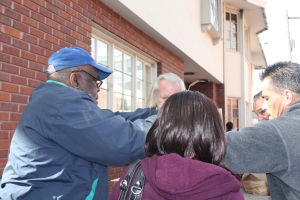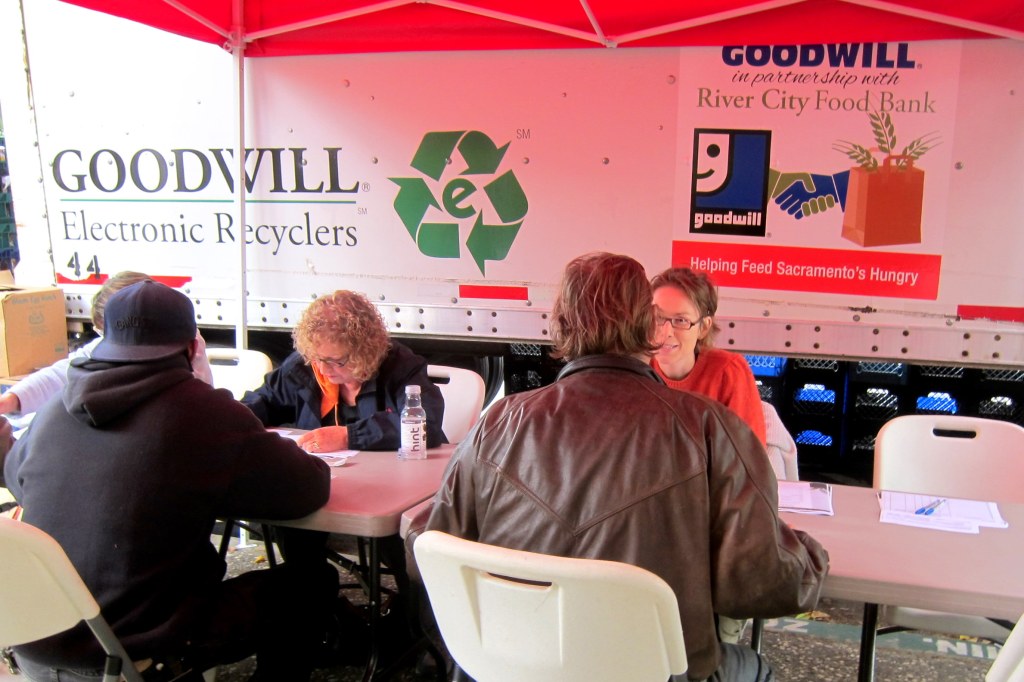Fourth in a series
We were blessed with clear skies in late October, but we knew we would have to get a roof over our heads as quickly as possible with winter coming. We also had to find a way to resume our administrative activities, something that was harder to do after Eileen’s laptop burned in the fire.
Our first step was to resume food distribution through what we called our “scrappy street operation.” After Goodwill received permission to park a trailer at the curb of our burned out locatio, Eileen wrote on October 27:
Parked in front of our charred building is a huge trailer sporting the Goodwill/RCFB partnership logo. We will be sorting, loading and storing our food donations tomorrow. Yay! Can’t thank Goodwill and Joe [Mendez] enough!”
 On October 29, we erected folding tables and chairs under pop-up red tents loaned by Jesuit High School, and with our paper orms and clip boards, prepared to start receiving clients on the sidewalk. The brick wall adjacent to the Episcopal Diocese of Northern California office (also burned out by the fire), became our staging area to weigh groceries and set up stores of bread and other non-perishables. More than 100 people showed up for help that first day, even though we had not promoted our opening.
On October 29, we erected folding tables and chairs under pop-up red tents loaned by Jesuit High School, and with our paper orms and clip boards, prepared to start receiving clients on the sidewalk. The brick wall adjacent to the Episcopal Diocese of Northern California office (also burned out by the fire), became our staging area to weigh groceries and set up stores of bread and other non-perishables. More than 100 people showed up for help that first day, even though we had not promoted our opening.
Those who came reflected the new profile of those in need. Since the recession began, we have fed more children and seniors. Among the people who came to us was a frail elderly woman. Helen did not have enough money to buy healthy food and had a difficult time getting around. Scerese, her social worker, drove Helen to our location and offered a steadying arm as she approached the table to answer our questions. Children were also in evidence. Even though it didn’t fit with our emphasis on healthy snacks, the children in the crowd enjoyed the lollipops that were handed out.
 Our staging area doubled as a receiving station for food drives. People began calling right after the fire offering to hold food drives to help us replace the 10,000 or more pounds of food that burned. Individuals began pulling up with trunks full of non-perishable foods. The Mountain Lions even got in the act when they arrived to sort food after inviting their fans to bring canned food to their October 30 game.
Our staging area doubled as a receiving station for food drives. People began calling right after the fire offering to hold food drives to help us replace the 10,000 or more pounds of food that burned. Individuals began pulling up with trunks full of non-perishable foods. The Mountain Lions even got in the act when they arrived to sort food after inviting their fans to bring canned food to their October 30 game.
Among the many calls were those from clients and former clients. They made us realize that many of our clients viewed RCFB as more than an agency they used:
I’m so sorry that happened to us, and I say “us” because I really feel a part of you. It hurts.”
Former clients like Anthony, owner of Mileena’s Thrift Store, called to say they couldn’t do much, but he and his family wanted to help. They gave their customers 15% off of their purchase if they brought in five cans of food to donate. “Many people in this area need help themselves, but they still wanted to help the food bank,” he told us.
During the most sleepless nights, messages and offers of assistance like these kept Eileen and the volunteers going.
Next: the challenge of getting a roof back over our heads
Posted by @philanthrophile, also known as Betsy Stone
Tip: If you’d like to keep up on the latest news about area hunger, RCFB’s efforts to rebuild or major events like Empty Bowls, subscribe to the e-newsletter by signing up on the website. Look for the email signup field, “Join our secure email list.”



